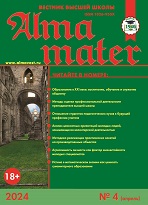UDC 37.09
https://doi.org/10.20339/AM.06-20.045
E.S. Vylkova is Dr.Sci. (Economics), Prof. at Russian Academy of National Economy and Public Administration under the President of the RF, North-West Institute of management — branch, Professor of the Department of Economics е-mail: vylkova-es@ranepa.ru
Presented is the analysis of contemporary challenges and demands of rapidly changing companies, incl. requirements of potential employers put in front of Russian universities the implementation of these new and innovative methods that would allow to develop not only professional competencies, but also professional skills that are universal and important to diverse professionals and the mastery of which allows professionals on the one hand, to improve the efficiency of professional activity in the industry, and on the other, to create the possibility of inter-industry mobility while maintaining its demand. One of the ways to solve such problems is the active introduction of gamification not only in the educational process, but also in various types of extracurricular activities: research, project, etc. Purpose: to make proposals to improve the gamification of the educational process as a tool for the formation of competencies of university graduates. Research methodology analysis of the current state and identification of directions of development of gamification when using it in the educational process and extracurricular activities of students. As a result, the need for the development and implementation in the educational process of universities for various educational programs of fundamentally new approaches to determining the quality of the forms of gamification, setting goals of the gameplay and evaluating the results.
Key words: gamification, game, competence, educational process, teaching method, innovations.
References
- Belchikov, Ya.M., Birshtein, M.M. Business games. Riga, 1989.
- Bessmertny, A.M., Gaenkova, I.V. Gamification as an educational paradigm of learning. Proceedings of Volgograd state pedagogical university. 2016. No. 6 (110). P. 15–22.
- Vylkova, E.S. Role-playing games as an innovative approach to improving the quality of the educational process in the university. Alma mater (Vestnik vysshej shkoly). 2014. No. 2. P. 87–90.
- Vylkova, E.S. Opinion poll in the framework of a new method of education “Variable game solution of difficult educational tasks” VIRTUOS. Alma Mater» (Vestnik vysshej shkoly). 2016. No. 4. P. 21–31.
- Kjempbell, J. The thousand-faced hero. St. Petersburg, 2018.
- Zikerman, G., Linder, D. How to break through the noise and grab the attention of employees and customers. Moscow, 2014.
- Verbah, K., Hanter, D. Engage and dominate. Game thinking in the service of business. Moscow, 2014.
- Mak-Gonigal, J. Reality is open to question. Why games make us better and how they can change the world. Moscow, 2008.
- Malkolm, G. A Tipping point. How minor changes lead to global changes. Moscow, 2016.
- Mitta, A. Cinema between Hell and Paradise. Cinema by Eisenstein, Chekhov, Shakespeare, Kurosawa, Fellini, Hitchcock, Tarkovsky. Moscow, 2016.
- Nefediev, I., Bronnikova, M. Gamification in business and in life: turn a routine into a game. Moscow, 2019.
- Nikitin, S.I. Gamification, gamification, gameization in the educational process. Young scientist. 2016. No. 9 (113). P. 1159–1162.
- Oleynik, Yu.P. Gamification in education: on the question of definition of the concept. Modern problems of science and education. 2015. No. 3. P. 476.
- Propp, V.Ya. Morphology of a fairy tale. Moscow, 2001.
- Chiksentmihay, M. Flow. Psychology of optimal experience. Moscow, 2018.
- Marczewski, A. Even Ninja Monkeys Like to Play: Gamification, Game Thinking & Motivational Design. Gamified UK, 2015.
- Bartle, R. Designing Virtual Worlds. New Riders, 2003.
- Bredl, K. Serious games and virtual worlds in education, professional development, аnd healthcare. IGI Global. 2013.
- Pappas, Ch. How Gamification Reshapes Learning. URL: https://elearningindustry.com/free-ebook/gamification-reshapes-learning/introduction
- Yu-kai, Chou. Actionable Gamification Beyond Points, Badges, and Leaderboards. CreateSpace Independent Publishing Platform. 2015.











.png)






